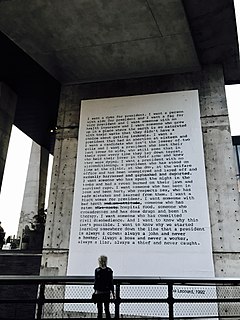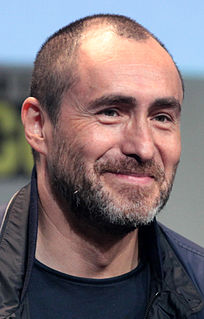A Quote by Henry Giroux
We're talking about race. It's ideology, it's a mode of policy. It's a practice. And it intertwines with class in a very specific way to create something very distinctive that we see now being legitimated in the United States by fascists who absolutely are unapologetic about what they're saying.
Related Quotes
The United States is a special case, and for me, very interesting. It's studied carefully and we know a lot about it. One of the most striking features of the elections is the class-based character of the vote. Now, class is not discussed or even measured in the United States. In fact, the word is almost obscene, except for the term "middle class." And you can't get exact class data; the census doesn't even give class data. But you can sort of see the significance of it just from income figures.
If I can't practice, I can't practice. It is as simple as that. I ain't about that at all. It's easy to sum it up if you're just talking about practice. We're sitting here, and I'm supposed to be the franchise player, and we're talking about practice. I mean listen, we're sitting here talking about practice, not a game, not a game, not a game, but we're talking about practice. Not the game that I go out there and die for and play every game like it's my last, but we're talking about practice man. How silly is that?
Something about photography is tied to a very specific relationship with the material world. It doesn't have to be, but the way I practice it, it is. So there's an act of observation, but it's not an act of objective recording. It's about framing something and seeing it and understanding that it's relational.
Secondly, there are such things as roving wiretaps. Now, by the way, any time you hear the United States government talking about wiretap, it requires - a wiretap requires a court order. [...] Nothing has changed, by the way. When we're talking about chasing down terrorists, we're talking about getting a court order before we do so. [...]
I think when you're talking about marriage equality and race, people very quickly start to get into their political corners: their ideology comes to the forefront, and they get into this platform argument that they're used to making, which really doesn't have anything to do with the day-to-day basics of what is being talked about.
We're sitting in here, and I'm supposed to be the franchise player, and we in here talking about practice. I mean, listen, we're talking about practice, not a game, not a game, not a game, we talking about practice. Not a game. Not, not... Not the game that I go out there and die for and play every game like it's my last. Not the game, but we're talking about practice, man. I mean, how silly is that?.. And we talking about practice. I know I supposed to be there. I know I'm supposed to lead by example... I know that... And I'm not... I'm not shoving it aside, you know, like it don't mean anything. I know it's important, I do. I honestly do... But we're talking about practice man. What are we talking about? Practice? We're talking about practice, man.
I have been very fortunate to see some very clearly excellent players play well to the very ends of their career, where they opted not to play anymore. I'm talking about Adrian Beltre. I'm talking about Torii Hunter. I'm talking about David Ortiz, Chipper Jones, Derek Jeter. These are players who decided, 'You know, I've had enough. That's good.'
I think that it's very important to have the United States' engagement in many situations we have around the world, be it in Syria, be it in the African context. The United States represents an important set of values, human rights, values related to freedom, to democracy. And so the foreign policy engagement of the United States is a very important guarantee that those values can be properly pursued.


































